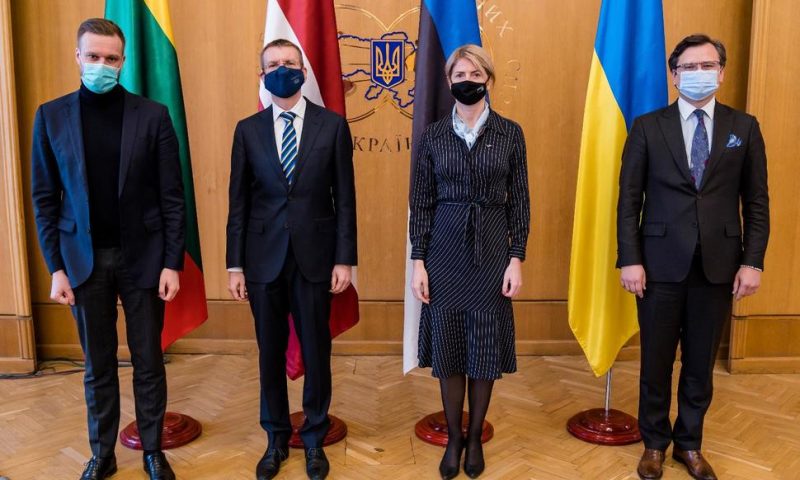Ukraine’s top diplomat is asking for stronger Western backing amid escalating tensions in the country’s east and a Russian troop buildup across the border.
KYIV, Ukraine — Ukraine’s top diplomat asked Thursday for stronger Western backing, saying “words of support aren’t enough” amid escalating tensions in the country’s east and a Russian troop buildup across the border.
Ukrainian Foreign Minister Dmytro Kuleba, speaking after talks with his counterparts from Estonia, Latvia and Lithuania, asked the Baltic nations to reach out to other European Union and NATO members about offering “practical assistance” to Kyiv.
More than 14,000 people have died in seven years of fighting between Ukrainian forces and Russia-backed separatists in eastern Ukraine that erupted after Russia’s 2014 annexation of Ukraine’s Crimean Peninsula. Efforts to reach a political settlement have stalled and violations of a shaky truce have become increasingly frequent in recent weeks across Ukraine’s eastern industrial heartland known as the Donbas.
Ukraine and the West also have sounded alarms about the concentration of troops along Russia’s border, a buildup that the U.S. and NATO have described as the largest since 2014.
Ukrainian President Volodymyr Zelenskyy heads Friday to Paris to discuss the tensions with French President Emmanuel Macron. At the end of their lunch, German Chancellor Angela Merkel will join them for a trilateral video call.
Zelenskyy said after chairing a meeting of Ukraine’s security council that the discussions in Paris will be important for preparing the so-called “Normandy format” talks involving the leaders of Ukraine, Russia, France and Germany.
Their last meeting in Paris in December 2019 helped ease tensions but failed to make any progress on a political settlement.
European Council President Charles Michel expressed the 27-nation bloc’s “unwavering support” for Ukraine, saying in a statement after the call with Zelenskyy that Russia’s moves on the border “represent threatening and destabilizing activities.”
Russia has argued that it’s free to deploy its forces wherever it deems necessary on its territory. The Russian defense minister charged earlier this week that the buildup was a response to security threats posed by NATO forces near Russia’s borders.
Russia’s Foreign Ministry spokeswoman Maria Zakharova on Thursday dismissed Western concerns about the troop buildup as a “propaganda campaign” and called on the West to encourage Kyiv to de-escalate tensions in the east.
Kremlin officials have warned Ukraine against trying to use force to reclaim control of the rebel east, saying that Russia may intervene to protect Russian civilians in the region.
“Russia isn’t interested in fueling a civil war in Donbas and will do everything to protect its citizens and ensure peace,” Zakharova said. She urged Ukraine’s Western allies to stop “encouraging the Kyiv regime to engage in disastrous bloody adventures” by providing military assistance and political support.
Amid the recent tensions, the U.S. informed Turkey that two U.S. warships would sail to the Black Sea on April 14-15 and stay there about three weeks. But Turkish Foreign Minister Mevlut Cavusoglu said Thursday that the U.S. Embassy had notified Ankara that the two warships wouldn’t be making the crossing.
U.S. Navy ships have made regular visits to the Black Sea in recent years, vexing Moscow. Earlier this week, a senior Russian diplomat described the planned U.S. naval deployment to the Black Sea as “openly provocative.”
In Thursday’s statement, Ukraine’s Foreign Ministry protested restrictions that Russia has imposed on shipping in the Black Sea starting next week and lasting until October because of its naval drills in the area.
The three Baltic nations said the visit by their top diplomats to Kyiv was intended to show support for Ukraine and send a warning to Russia.
“This visit is intended to show that we stand in solidarity with Ukraine (and) strongly support this country and its right to self-defense,” said Lithuanian Foreign Minister Gabrielius Landsbergis, adding that it was also to “demonstrate to Russia that further provocative actions can have consequences.”

